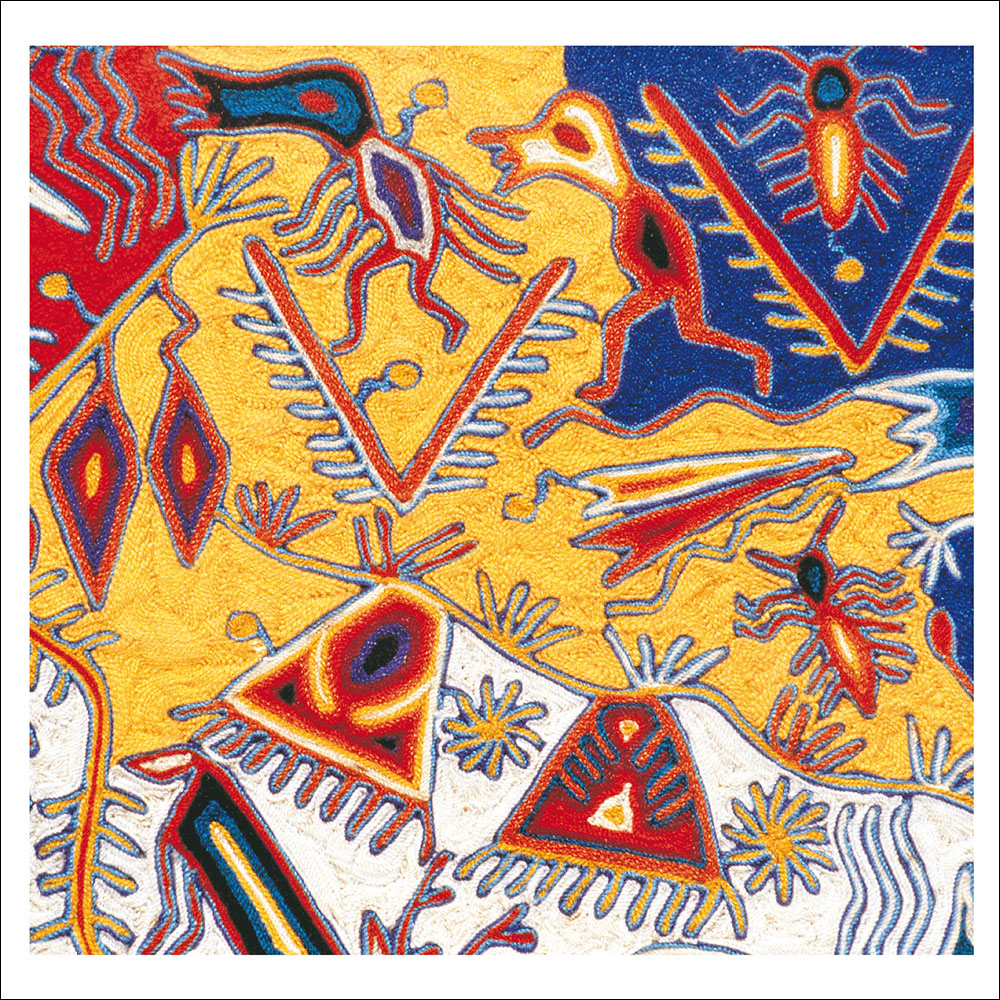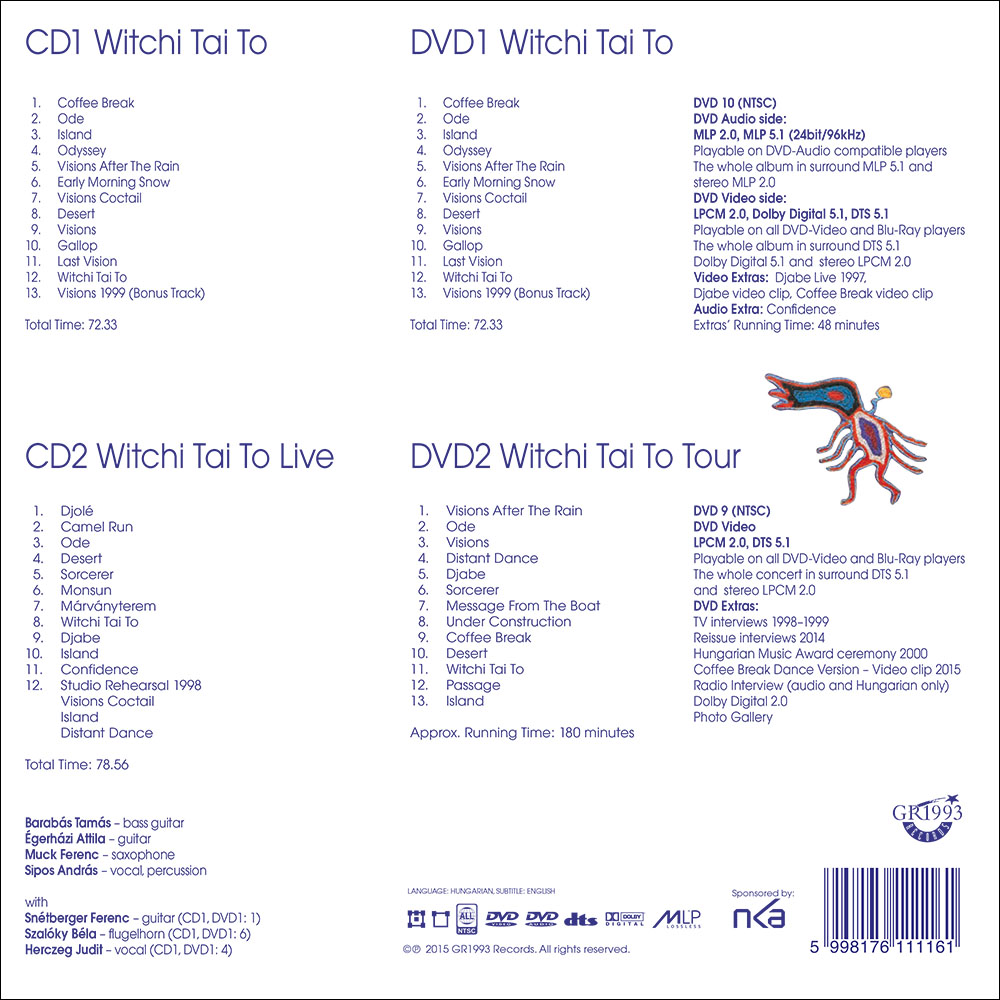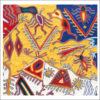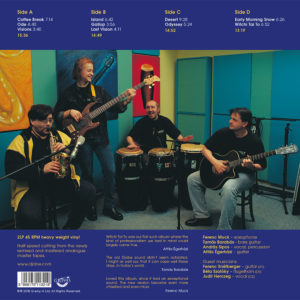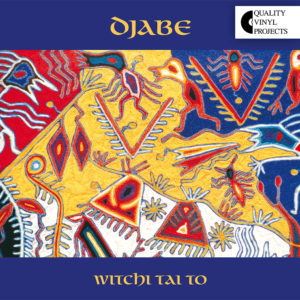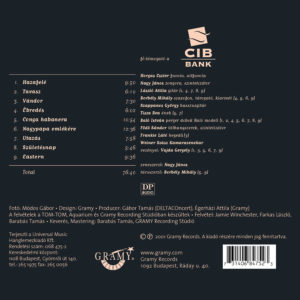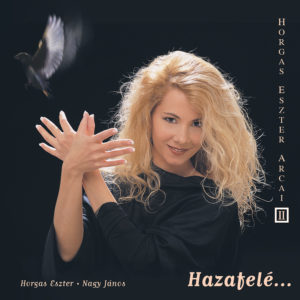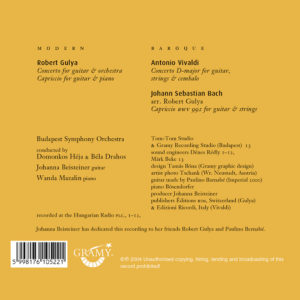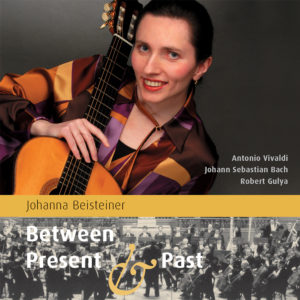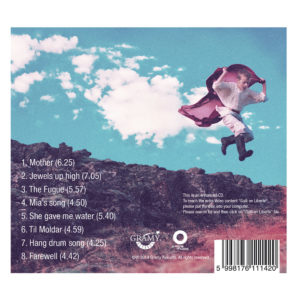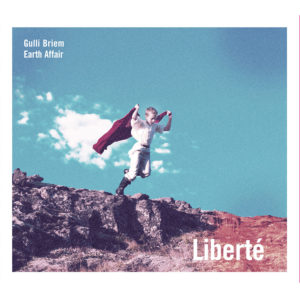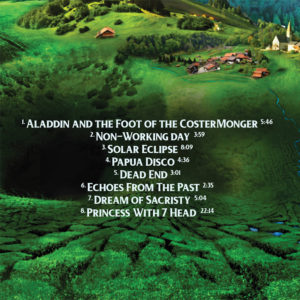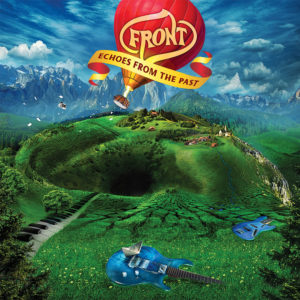Description
The monstre re-release of the award-winning Djabe album of 1998, which is considered a milestone to jazz/world music has come out. The mediabook packed four discs with the remixed version of “Witchi Tai To” contains more than three hours of previously unreleased extra material like video clips, interviews, unreleased live audio and video recordings, hundreds of unseen photos and interesting articles about the award-winning album and the Djabe. All this contained in a luxurious LP-sized high-quality book, 64 pages long.
András Sipos, also known as “Sipi” an actor-musician man above the ordinary, met Novus Jam band led by Attila Égerházi in 1994, the band he also became a member of. Following two albums they started a new project in 1995 under the name “Djabe”. The original musicians of Novus Jam and new jazz musicians who later formed Djabe, played together on the debut album released in 1996. Following the success of the first album a huge need arose for the live introduction of Djabe’s music world – and for that a permanent line-up was also required. The formation with Attila Égerházi (guitar), András Sipos (vocal, percussion), Tamás Barabás (bass guitar) and Ferenc Muck (saxophone) started to perform in 1997, and this line-up considered to be the first classical formation.
The unique music has been accompanied by special visual world since the first gig. The high standard stage visuals were provided by the Vari*Lite lighting system. The ballet led by Gábor Bakó completed the show.
In 1998, Djabe’s second though as a band, its first big album was completed, which was, actually entitled after Jim Pepper’s undying classics, the forever green title: ‘Witchi Tai To’. The Sipis’ supported the CD shop keepers and the Djabe familiarising music fans in this way to place the band on the shelves between the performers and the styles. The star guest of the album, the Trio Stendhal’ Legend, Ferenc Snétberger became a world-famous guitar artist.
The second Djabe release is a well- weighed and a fully developed production. It is just typical of its musical freedom that the former ‘crew’ of Djabe – while having the universally recognisable, repetitive ‘tribal’ rhythms harmonized – bravely combined the characteristics of various continent’s folk music, the standard melody forms; and the stylistic characteristics of funk, popular jazz and pop music in the good sense on the album ‘Witchi Tai To’ (and also on its follower album: ‘Ly-O-Lay Ale Loya’). The result became awe-inspiring. On outcome, it achieved sudden overwhelming success, and this deed almost blasted the national pop profession. ‘Witchi Tai To’ has been on one hand, recognised now as a musical milestone and a standard work of art on the other.
The album received Hungarian Music Award in jazz / world music category, as the “Domestic World Music Album of the Year”.
In 2015, twenty years after the launch of Djabe, “Witchi Tai To” released again in Deluxe mediabook edition format. The LP-size, 64-page hardcover book describes this period of time exhaustively and expansively.
The first CD and the first DVD introduces the songs of the album (which have yet matured classical) in a version re-mixed by Tamás Barabás, while on the DVD, in surround version, it is done as showing many hidden finesses from the music.
The DVD-Audio version from Djabe, which had already released in 2014 as an independent and trailer edition, is now a usual double CD (DVD-10) in which one of the sides is an original DVD-A (the full album is in 5.1 MLP Surround and 2.0 MLP stereo, 24 bit / 96 kHz formats), and the second one is however a standard DVD-Video (the full album is in 5.1 DTS Surround, 5.1 Dolby Digital Surround and 2.0 PCM Stereo 24 bit / 48 kHz formats.) which contains additional exciting extras. One of these is “Confidence”, which was originally on the “Enhanced” CD and 1997 concert film entitled Djabe Live 1977. Moreover, two such additional video clips got place on the album, which were made after the release of the album, and were made for the hit songs titled “Djabe” and “Coffee Break”.
The second CD, which holds the title “Witchi Tai To Live” contains concert versions from the time between 1997 and 1999 (including the material of ’98 Marble Hall concert), the original bonus song on the bonus disc of the original CD edition and rehearsal room recordings from 1998.
The second DVD, however, is the upgraded version of the classical concert video entitled “Witchi Tai To Tour 1998” which was previously only available in VHS format that came to light in 1999. Besides plenty of extras, even contemporary TV- and radio interviews with lots of music can be found, furthermore photo albums, the Golden Giraffe Award Ceremony, the video clip of Coffee Break of 2015 (Dance version), 20 minutes from the rehearsal, as well as there are comprehensive, retrospective interviews which belong to re-release. It is absolutely worth highlighting here that Tamás Barabás, besides his bass-guitar play, carried out an exceptionally great job as a sound engineer, too. He mixed the material so sensationally at that time the original and now the upgraded material that ‘Witchi Tai To’ deserve special attention if only because of his job.
The re-release of the 4-disc Deluxe, ’Witchi Tai To 2015’ will undoubtedly prove to be the most demanding domestic edition of the year, which has high expectations before other retrospective compositions.
The re-release of one Djabe’s master creation is a compulsory work!
Musicians
Barabás Tamás – bass guitar, percussions
Égerházi Attila – guitar, percussions
Muck Ferenc – saxophone, percussions
Sipos András – percussions, vocal
Snétberger Ferenc – guitar
Szalóky Béla – flugerhorn
Djabe – Djabe
Djabe – Coffee Break
Djabe – Desert
The monstre re-release of the award-winning Djabe album of 1998, which is considered a milestone to jazz/world music has come out. The mediabook packed four discs with the remixed version of “Witchi Tai To” contains more than three hours of previously unreleased extra material like video clips, interviews, unreleased live audio and video recordings, hundreds of unseen photos and interesting articles about the award-winning album and the Djabe. All this contained in a luxurious LP-sized high-quality book, 64 pages long.
András Sipos, also known as “Sipi” an actor-musician man above the ordinary, met Novus Jam band led by Attila Égerházi in 1994, the band he also became a member of. Following two albums they started a new project in 1995 under the name “Djabe”. The original musicians of Novus Jam and new jazz musicians who later formed Djabe, played together on the debut album released in 1996. Following the success of the first album a huge need arose for the live introduction of Djabe’s music world – and for that a permanent line-up was also required. The formation with Attila Égerházi (guitar), András Sipos (vocal, percussion), Tamás Barabás (bass guitar) and Ferenc Muck (saxophone) started to perform in 1997, and this line-up considered to be the first classical formation.
The unique music has been accompanied by special visual world since the first gig. The high standard stage visuals were provided by the Vari*Lite lighting system. The ballet led by Gábor Bakó completed the show.
In 1998, Djabe’s second though as a band, its first big album was completed, which was, actually entitled after Jim Pepper’s undying classics, the forever green title: ‘Witchi Tai To’. The Sipis’ supported the CD shop keepers and the Djabe familiarising music fans in this way to place the band on the shelves between the performers and the styles. The star guest of the album, the Trio Stendhal’ Legend, Ferenc Snétberger became a world-famous guitar artist.
The second Djabe release is a well- weighed and a fully developed production. It is just typical of its musical freedom that the former ‘crew’ of Djabe – while having the universally recognisable, repetitive ‘tribal’ rhythms harmonized – bravely combined the characteristics of various continent’s folk music, the standard melody forms; and the stylistic characteristics of funk, popular jazz and pop music in the good sense on the album ‘Witchi Tai To’ (and also on its follower album: ‘Ly-O-Lay Ale Loya’). The result became awe-inspiring. On outcome, it achieved sudden overwhelming success, and this deed almost blasted the national pop profession. ‘Witchi Tai To’ has been on one hand, recognised now as a musical milestone and a standard work of art on the other.
The album received Hungarian Music Award in jazz / world music category, as the “Domestic World Music Album of the Year”.
In 2015, twenty years after the launch of Djabe, “Witchi Tai To” released again in Deluxe mediabook edition format. The LP-size, 64-page hardcover book describes this period of time exhaustively and expansively.
The first CD and the first DVD introduces the songs of the album (which have yet matured classical) in a version re-mixed by Tamás Barabás, while on the DVD, in surround version, it is done as showing many hidden finesses from the music.
The DVD-Audio version from Djabe, which had already released in 2014 as an independent and trailer edition, is now a usual double CD (DVD-10) in which one of the sides is an original DVD-A (the full album is in 5.1 MLP Surround and 2.0 MLP stereo, 24 bit / 96 kHz formats), and the second one is however a standard DVD-Video (the full album is in 5.1 DTS Surround, 5.1 Dolby Digital Surround and 2.0 PCM Stereo 24 bit / 48 kHz formats.) which contains additional exciting extras. One of these is “Confidence”, which was originally on the “Enhanced” CD and 1997 concert film entitled Djabe Live 1977. Moreover, two such additional video clips got place on the album, which were made after the release of the album, and were made for the hit songs titled “Djabe” and “Coffee Break”.
The second CD, which holds the title “Witchi Tai To Live” contains concert versions from the time between 1997 and 1999 (including the material of ’98 Marble Hall concert), the original bonus song on the bonus disc of the original CD edition and rehearsal room recordings from 1998.
The second DVD, however, is the upgraded version of the classical concert video entitled “Witchi Tai To Tour 1998” which was previously only available in VHS format that came to light in 1999. Besides plenty of extras, even contemporary TV- and radio interviews with lots of music can be found, furthermore photo albums, the Golden Giraffe Award Ceremony, the video clip of Coffee Break of 2015 (Dance version), 20 minutes from the rehearsal, as well as there are comprehensive, retrospective interviews which belong to re-release. It is absolutely worth highlighting here that Tamás Barabás, besides his bass-guitar play, carried out an exceptionally great job as a sound engineer, too. He mixed the material so sensationally at that time the original and now the upgraded material that ‘Witchi Tai To’ deserve special attention if only because of his job.
The re-release of the 4-disc Deluxe, ’Witchi Tai To 2015’ will undoubtedly prove to be the most demanding domestic edition of the year, which has high expectations before other retrospective compositions.
The re-release of one Djabe’s master creation is a compulsory work!
Musicians
Barabás Tamás – bass guitar, percussions
Égerházi Attila – guitar, percussions
Muck Ferenc – saxophone, percussions
Sipos András – percussions, vocal
Snétberger Ferenc – guitar
Szalóky Béla – flugerhorn
Djabe – Djabe
Djabe – Coffee Break
Djabe – Desert
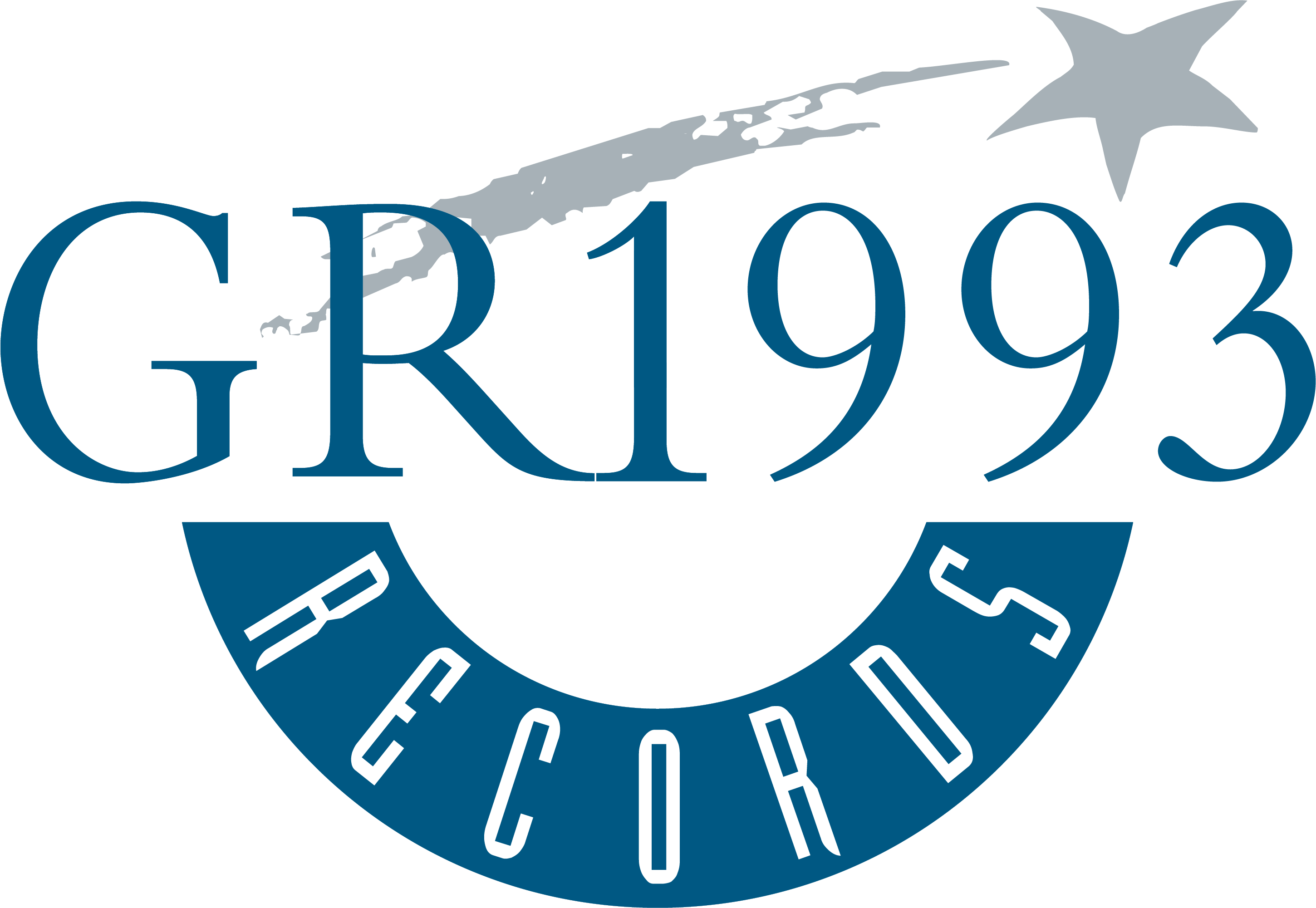

 Magyar
Magyar